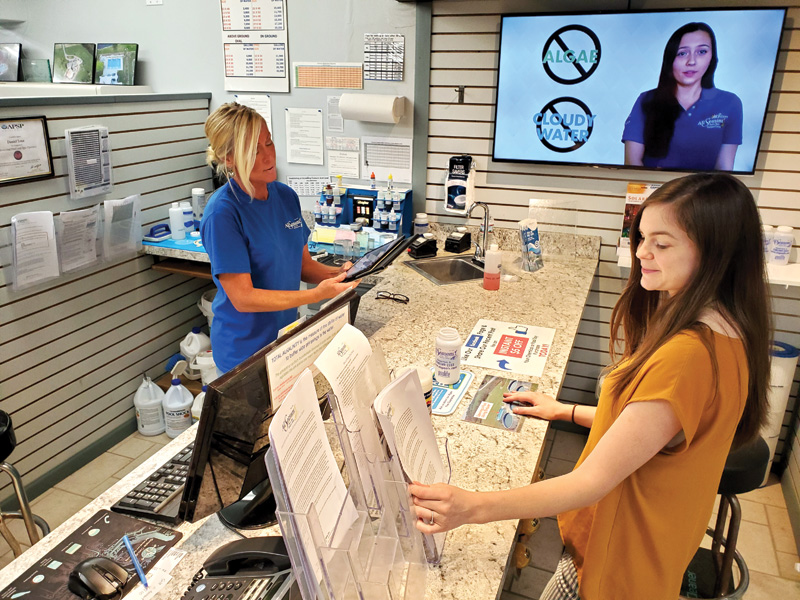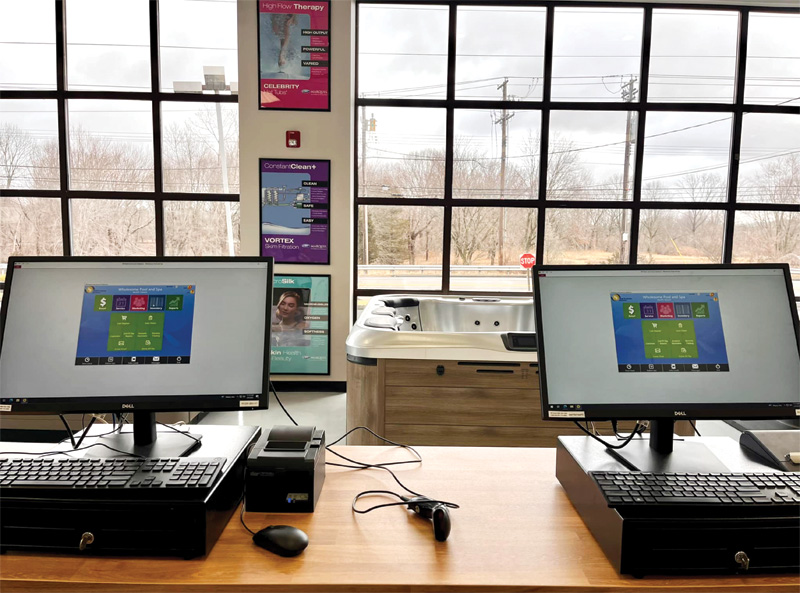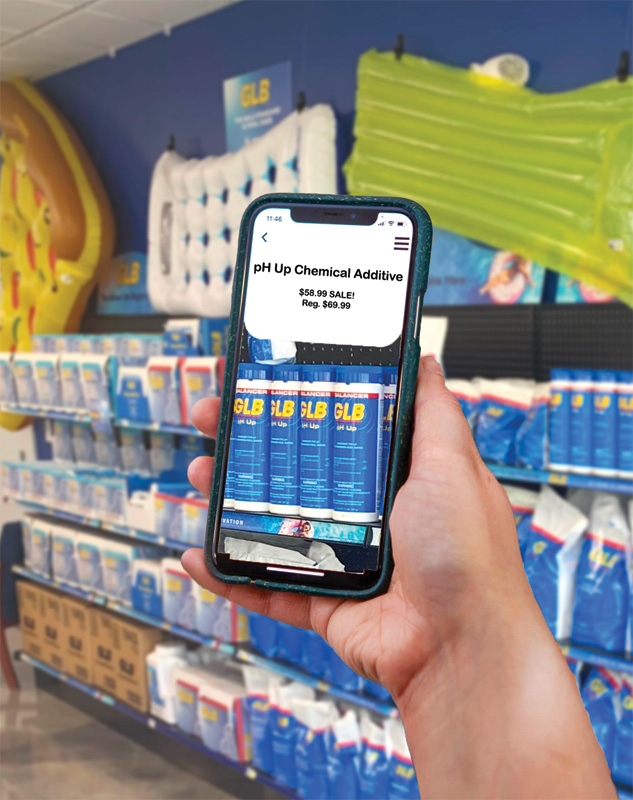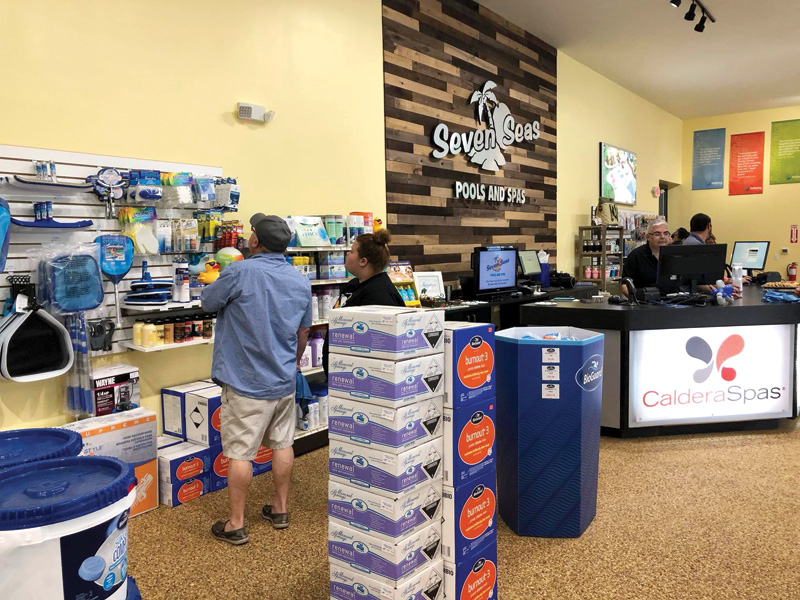By Rachael Pritz

Customer database software is crucial in linking customers with staff, streamlining operations, and ensuring that businesses provide excellent service while maintaining strong customer relationships. By optimizing customer relationship management (CRM) systems, pool and hot tub retailers can better manage interactions with current and potential customers, fostering sales growth and enhanced customer satisfaction.
CRM systems enable retailers to maintain detailed customer profiles, including pool and spa equipment information, purchase history, preferences, and service records. This allows for personalized service and targeted marketing. For example, when a customer visits the store to purchase filter hoses, the retailer can refer to their equipment profile to determine which filtration system they have, ensuring the correct hose size is provided.
An efficient CRM improves the customer experience and unlocks valuable insights that can lead to new business opportunities. With well-organized data, retailers can leverage CRM systems to predict customer needs and tailor services to maximize revenue potential.
CRM systems have helped pool and hot tub retailers identify new business opportunities, including targeted upselling and cross-selling. By analyzing customer purchase history and preferences, retailers can recommend related products, such as pool accessories, maintenance supplies, or water care items, which can increase the average transaction value. For instance, some CRM systems offer pop-up suggestions for related items that sales clerks can offer customers. If a customer is purchasing wall cleaner, the system might suggest complementary products such as a wall brush, filter cleaner, or skimmer socks. Additionally, CRM systems support loyalty programs, which incentivize repeat purchases and help foster long-term customer relationships, driving further business growth.
Capturing valuable data
Collecting detailed customer information is essential for creating personalized interactions, ultimately leading to higher sales. Innovative pool and hot tub retailers go beyond basic data collection by capturing essential information aligned with their long-term growth goals. By gathering this detailed information, businesses can identify trends and pinpoint potential business opportunities, such as offering new products or services or expanding into new store locations.
When setting up a CRM system, pool and hot tub retailers should prioritize several key data types. First, tracking purchase history is essential, as it allows retailers to monitor what products customers have bought, including specific brands and categories. This information helps identify customer trends and preferences, enabling more effective upselling and cross-selling strategies. Second, maintaining detailed service records is crucial, as documenting past services, maintenance schedules, and repairs enables retailers to provide timely follow-ups and personalized service, which enhances overall customer satisfaction. Lastly, gathering customer feedback and reviews is essential for identifying improvement areas while highlighting successful products or services. This feedback provides valuable insights that can shape future business decisions and improve customer loyalty.

A powerful CRM system allows retailers to set up specific, user-defined fields that help capture detailed customer preferences and behaviours. For example, businesses can track whether clients shop at competitors for products such as patio furniture or chemicals or use another service provider for pool maintenance. Instead of relying on hunches about business opportunities, data collected in a CRM system provides a clear, data-driven path for action. This is particularly useful during peak seasons when immediate insights are needed to capitalize on market trends.
Retailers can encourage customers to share more detailed information to enrich their CRM data through various strategies. One effective approach is offering loyalty programs that reward customers with points or discounts when they provide additional information, whether during sign-up or by completing surveys. Another method is giving exclusive offers or promotions available only to customers who share detailed preferences or feedback, giving them a tangible incentive to engage more deeply. Additionally, retailers can use social media to ask targeted questions about customer preferences or experiences, creating opportunities for followers to share valuable insights more casually and interactively. These strategies enhance CRM data and strengthen customer relationships by providing personalized rewards and offers.
The importance of integration
It is crucial for a CRM database to integrate seamlessly with other business software to avoid redundant data entry. For example, instead of having staff at a pool or hot tub retail store re-enter basic customer information—distracting them from more valuable tasks—an integrated system allows retailers to capture powerful transactional and profile details that enhance future marketing efforts. Automatically capturing key details such as pool or spa brands, equipment models, and purchase history allows staff to prioritize gathering more personalized customer insights.
CRM systems should integrate with various business software to enhance functionality and improve operational efficiency. For instance, combining with water testing systems allows retailers to link test results directly to customer profiles. This enables personalized recommendations for chemicals and treatments based on the customer’s specific water quality needs, enhancing satisfaction and encouraging repeat business. Additionally, it eliminates the need for duplicate entries by syncing customer name and address information with the water lab system, streamlining the process.
Another key integration is with vendor platforms, which can significantly increase efficiency by automating data entry and simplifying order management. For example, purchase orders can be entered once in the CRM and automatically sent to vendors, reducing the need for manual phone or fax orders. This integration also supports accounts payable by ensuring accurate costing and billing, minimizing errors, and helping retailers focus on improving customer service instead of managing administrative tasks. These integrations provide a seamless experience that boosts internal operations and customer satisfaction.
By ensuring that transactional details, such as product serial numbers and warranty information, are linked directly to customer profiles, service teams can easily access relevant information on the go. This integration enables quick upsell opportunities and ensures that customer service is efficient and informed.
Leveraging user-defined data
User-defined fields in a CRM system allow pool and hot tub retailers to gather and categorize valuable customer information. Retail professionals can prompt staff to ask specific questions, such as whether a customer has a salt chlorine generator or a vinyl liner, how old their pool or spa is, or whether they use a winter cover or solar blanket. Collecting these details enables businesses to segment customers effectively and create targeted marketing campaigns.
Pool and hot tub retailers can effectively train their staff to gather user-defined data using practical and engaging techniques. One effective approach is incorporating role-playing scenarios during training sessions. This allows staff to simulate real-life customer interactions and practice asking the right questions and gathering important information in a supportive, low-pressure environment. It is also important to train staff to explain the value of sharing information with customers. By clearly communicating how providing details can lead to more personalized service, tailored product recommendations, and improved maintenance plans, staff can make customers feel more comfortable and motivated to share relevant information. This combination of hands-on practice and clear communication helps ensure that staff can effectively capture valuable data while enhancing the customer experience.
For example, businesses can identify clients who have not purchased chemicals recently, scheduled a service call, or own older model spas and use this information to design direct mail, email, or social media campaigns to bring these customers back into the store. Segmenting and communicating with highly targeted groups is one of the key advantages of integrating an optimized CRM system, even during the off-season.
● Customer segmentation allows retailers to tailor promotions based on customers’ purchase behaviour.
● Seasonal campaigns target customers with timely offers for pool maintenance and preparation.
● Post-purchase follow-ups enhance customer engagement and encourage repeat business.
Pool and hot tub retailers have run several effective targeted marketing campaigns using CRM data to boost customer engagement and sales. One such approach is customer segmentation, where retailers group their customers into categories such as new buyers, repeat customers, or service users, and then offer tailored promotions for each segment. For example, offering a discount on maintenance services to existing customers who have not purchased recently can re-engage them.

Another powerful method is seasonal campaigns, such as spring opening specials, to encourage customers to purchase supplies and schedule maintenance before pool season begins. Winterization campaigns are also effective, offering discounts for winterizing pools and hot tubs, ensuring customers are prepared for seasonal changes.
Additionally, post-purchase follow-ups allow retailers to stay connected with customers after a purchase, offering usage tips, maintenance advice, or requesting feedback. These follow-ups not only improve customer satisfaction but also encourage repeat business.
Best practices for CRM optimization
To truly benefit from a CRM system, pool and hot tub retailers should ensure their software is user-friendly and customizable. Key features to look for in a CRM include:
● Ease of use: A CRM should have an intuitive interface, with training and tech support readily available for the team.
● Customization: The ability to tailor the CRM to a business’s specific needs, workflows, and terminology is essential for maximizing utility.
● Integration: Seamless integration with other tools, such as email marketing platforms or water testing software, is crucial for efficiency.
● Customer and lead management: Segmenting and tracking customers and leads through the sales pipeline is fundamental to managing relationships effectively.
● Sales and marketing tools: Automating sales and marketing processes helps streamline operations and boost productivity.
● Customer support and analytics: Tracking customer service requests and engagement metrics through reporting tools allows for data-driven decision-making.
● Automatic alerts: Set up across departments, alerts inform staff of customer needs and allow timely follow-ups on products, services, or offers.
Increasing efficiency and sales
with a well-managed CRM
An effective CRM does not just streamline data collection—it actively enhances marketing, sales, and service efforts. For pool and hot tub retailers, setting up specific alerts and managing customer interactions efficiently ensures that valuable customer data is used to its full potential. This includes updating customer email addresses regularly, tracking which customers have purchased particular products (such as inground pool covers), and using referral data to pinpoint new geographic markets for expansion.
CRM systems can play a key role in helping retailers explore new geographic markets and expand their customer base by providing detailed sales tracking reports. These reports allow retailers to analyze sales data and segment it by region, helping to identify high-performing areas where expansion may be profitable and underperforming markets that may require more targeted marketing efforts. By understanding where their products and services are most in demand, retailers can make informed decisions about where to focus their growth efforts. In addition, CRM data can reveal trends in customer preferences within specific regions, enabling retailers to tailor their offerings to meet local demands better and increase their market share.
Further, CRM systems can help identify which marketing channels are most effective: radio, social media ads, or word-of-mouth referrals. By analyzing data within the CRM, retailers can make informed decisions about where to allocate marketing dollars, ensuring the highest return on investment.

Building a valuable CRM database
A CRM database is only as effective as the quality of its data. For pool and hot tub retailers, ensuring that staff consistently update customer profiles with new purchases, service history, and water testing results allows businesses to run more effective sales campaigns and take advantage of emerging market opportunities. For example, identifying customers with older equipment or who have not scheduled recent service calls creates a clear opportunity to offer maintenance services or upgrades.
Retailers can implement a few key strategies to ensure CRM data remains accurate and up to date. One important step is conducting routine checks or periodic audits of the CRM system. These audits help identify and correct inaccuracies, remove duplicate entries, and update outdated customer information, keeping the database clean and reliable. Another effective approach is establishing consistent formats for data entry, such as using standardized formats for dates, addresses, and contact information. This minimizes the risk of errors during data entry and ensures uniformity across the system. By regularly maintaining the integrity of the data, retailers can rely on their CRM for more accurate customer insights and better decision-making.
Keeping the CRM database clean is also essential, with regular data updates and duplicate removals. With a well-organized CRM, pool and hot tub retailers can easily run multiple marketing campaigns, targeting different customer segments with specific offers.
Conclusion
With the growing demand for pools, spas, and outdoor living spaces, pool and hot tub retailers must harness the power of a CRM system to drive growth and maintain customer relationships. By capturing detailed customer data, integrating CRM with business operations, and running targeted marketing campaigns, businesses can boost short-term revenue and ensure long-term success.
Investing in a powerful CRM system enables businesses to work smarter, not harder—strengthening customer relationships, increasing sales, and positioning the company for future growth.
Author

Rachael Pritz has been active in the pool industry for more than 20 years, which has provided her with all-encompassing expertise in the trade. She worked at a local pool store while pursuing a master’s degree at the University of Pittsburgh, Pa. With her technical skills and industry knowledge, she joined the launch of RB Retail & Service Solutions in Pittsburgh in 2003. She can be reached at rachael@rbcontrolsystems.com.






